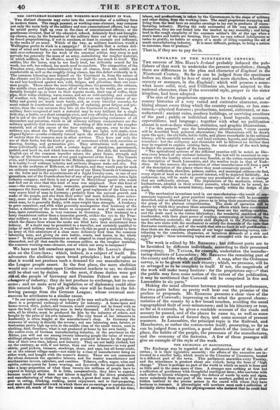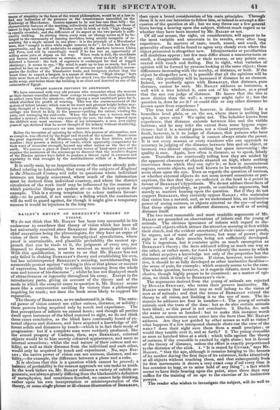ENGLAND IN THE NINETEENTH CENTURY. THE success of Mrs. HALL'S
Ireland probably induced the publishers of that work to undertake the present speculation • though there are differences in the plan and character of England in the Nineteenth Century. So far as can be judged from the specimens before us, there will be less of story and mere sketches, whether of scenery or manners, in the England; which will possess a somewhat more solid, real, and Utilitarian air, better adapted to the national character, than if the mercurial style, proper to the sister kingdom, had been adopted. The aim of the proprietors appears to be to furnish a series of county histories of a very varied and extensive character, combining almost every thing which the country contains, or has contained,—physical features ; productions, natural, cultivated, or manufactured; ancient ruins modern buildings, or surviving erections of the past ; public or individual story ; local legends, manners, superstitions, and language ; together with what no publication . almost is now-a-days without, statistics, and graphic illustrations.
"For this purpose, says the introductory advertisement, 'every county will be described from personal observation ; the illustrations will be drawn upon the spot; the old halls, battle-fields, and places remarkable in the national history, will be carefully noticed ; and local customs, legends, and singularities, remarked: but the antiquary and chronicler will be followed no further than may be required to explain existing facts, the main object of the work being to depict the present aspect of the country.
"The agricultural systems of the different counties will be noted, as likewise every branch of our national industry. The last will be examined in connexion with the locality where each may flourish, as the cotton-manufacture in the description of South Lancashire, and the woollen trade in that of Yorkshire. In like manner, the production of other manufactures will form a part of the description of the places where they most extensively prevail. •
"Our cathedrals, churches,' palaces, castles, and municipal edifices—in fact, every object of local as well as general interest, will be depicted faithfully. An endeavour, too, will be made to portray any peculiarities of dress or carriage that are sufficiently obvious. The implements of the mechanic, miner, or husbandman, adopted in their several pursuits, when found to be novel, together with objects in natural history, come equally within the design of the work.
"The mechanical inventions used in our manufactories—the result of consummate ingenuity and great practical experience united—will be accurately described, and so illustrated by the graver as to bring their construction within the grasp of the plainest comprehension. The mode of operation will be shown by which they produce those astonishing effects which have contributed so largely to the national opulence. Among these are the carding-machine, and the mule used in the cotton fabrication ; the wonderful machines of the ironfounder, with their giant power of rending, compressing, or laminating the most refractory materials • the plastic skill displayed in the Potteries, where the fine arts unite with the mechanical to satisfy the demands of the taste that fluctuates continually, and of the wealth that sets no limit to self-gratification : then there are the countless products of our larger manufacturing-towns, contributing to the comforts, elegancies, or luxurious demands of a rich and mighty people : these interesting topics are all connected with the present design The work is edited by Mr. REDDING ; but different parts are to be furnished by different individuals, according to their presumed competency. Dr. TAYLOR, for example, undertakes the manufacturing-districts of Lancashire ; Mr. REDDING the remaining part of the county and the whole of Cornwall. A map, after the Ordnance survey, is to be given with each county; which, we presume, will be so arranged as to be complete in itself. If not, the magnitude of the work will make many hesitate : for the proprietors say—" that the public may form some notion of the extent of the publication, it may be mentioned that Cornwall will be comprised in five and Lancashire in six parts." • Making the usual allowance between promises and performance, the two parts before us pretty well bear out the promise of the preface or proposals. Mr. REDDING presents a clear view of the features of Cornwall; impressing on the mind the general characteristics of the county by a few broad touches, avoiding the usual topographical fault of over-minuteness; and in his itinerary or tour, so far as it extends, he gives a readable account of the roads and scenery he passed, and of the places be came to, as well as some anecdotes or stories of former days, and some, account of present manners. In Lancashire, the principal topic is the Railroad, and Manchester, or rather the cotton-town itself; presenting, so far as can be judged from a portion, a good sketch of the interior of the place, the habits of the people, the processes of the manufactures, and the economy of the factories. A few of these passages will give an example of the style of the work.
THE EXCHANGE AT MANCHESTER.
The Exchange may be regarded as the parliament-house of the lords of cotton • it is their legislative assembly: the affairs of the executive are intrusted to a smaller body, which meets in the Chamber of Commerce, located in a different part of the town. This parliament assembles every Tuesday, and the attendance is greatest about one o'clock, being the hoursif "high change." There is perhaps no part of the world in which so much is done and so little said in the same space of time. A stranger sees nothing at first but a collection of gentlemen with thoughtful intelligent faces; who converse with each other in laconic whispers, supply the defects of words by nods and signs, move noiselessly from one part of the room to another, guided as if by some hidden instinct to the precise person in the crowd with whom they have business to transact. A phrenologist will nowhere meet such a collection of decidedly clever heads ; and the physiognomist who declared that lie could find traces of stupidity in the faces of the wisest philosophers, would be at a loss to find any indication of its presence in the countenances assembled on the Exchange at Manchester. Genius appears to be not less rare than folly : the characteristic features of the meeting, collectively and individually, are those of talent in high working order. Whether trade be brisk or dull, "high change" • is equally crowded; and the difference of its aspect at the two periods is sufficiently striking. In stirring times, every man on 'change seems as if he belonged to the community of dancing dervishes, being utterly incapable of remaining for a single second in one place : it is the principle of a Manchester man, that "nought is done while aught remains to do"; let him but have the opportunity, and he will undertake to supply all the markets between China and Peru, and will be exceedingly vexed if he has lost an opportunity of selling some yarn at Japan on his way. When trade is dull, the merchants and factors stand motionless as statues, or move about as slowly as if they followed a funeral : the look of eagerness is exchanged for that of dogged obstinacy ; it seems to say, "My mind is made up to lose so much, but lam resolved to lose no more." An increase of sternness and inflexibility accompanies the decline of the Manchester trade, and foreigners declare that the worst time to expect a bargain is a season of distress. "High change" lasts little more than an hour; after the clock has struck two, the meeting gradually melts away, and before three the building is as silent and deserted as one of the catacombs of Egypt.
INFANT LABOUR PREVIOUS TO ARKWRIGHT.
We bare conversed with very old persons who remember when the weavers or their factors travelled about from cottage to cottage with their pack-horses to collect yarn from the spinsters; often paying a most exorbitant price for it, which absorbed the profits of weaving. This was the commencement of the system of infant labour; which was at its worst and greatest height before anybody thought of a factory. Spinning was so profitable that every child in the cottage was forced to help in the process—picking the cotton, winding the yarn, and arranging the card-ends. When the father was a weaver, and the mother a spinner, which was very commonly the case, the tasks imposed upon the children were most onerous. One of my informants, a man over eighty years of age, declared that he never thought of his infancy without shuddering.
DELICACY OF THE IIINDOO TOUCH.
Before the invention of spinning by rollers, this process of attenuation, now so complex, was effected by the finger and thumb of the spinner. Hence arose the great superiority of the Hindoos, especially in the finer fabrics, such as muffins : they possess a delicacy of touch, which apparently compensates for their want of muscular strength, beyond any other nation on the face of the earth. We possess a piece of Dacca muslin woven of hand-spun yarn, and it requires the assistance of the microscope to discover that the sensitive fingers of the Hindoo spinner hare failed to produce a thread equal in evenness and regularity to that wrought by the multitudinous rollers of a Manchester factory.
It is easily seen, by an inspection even of the matter already published relating to Lancashire, that many of the subjects of England in the Nineteenth Century will refer to questions where individual interests are largely concerned, where much of the information must be derived from individual courtesy, and where the district circulation of the work itself may be influenced by the manner in which particular things are spoken of—as the factory system for example. This is a strong temptation to colour matters favourably—to be partial, if not untrue : a failing which the conductors will do well to guard against, for though it might give a temporary success it would be injurious in the long run..



























 Previous page
Previous page